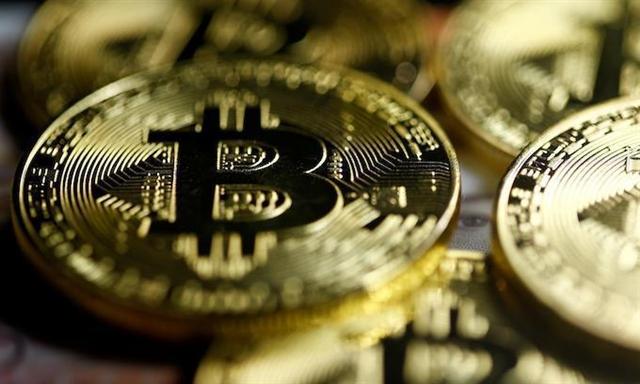Stocks, cryptocurrencies the new darlings as other assets remain in deep slump
Stocks, cryptocurrencies the new darlings as other assets remain in deep slump
With most traditional asset classes taking a beating from the economic downturn caused by Covid-19, investors are flocking to the stock and cryptocurrency markets.
Bitcoins are seen in this illustration picture by Reuters/Dado Ruvic.
|
At lunch time on a regular working day, a smartly dressed young woman was sitting in a corner in a downtown HCMC cafeteria, staring at a laptop in front of her. She was going back and forth between charts and messaging apps to check what her broker was sending.
She was a newbie on the stock market, having begun just two weeks earlier.
Thanh Dang, 26, a full-time administrative assistant, explained her decision: "These days no one in my office does any work except text or talk to each other about stocks, forex and cryptocurrencies.
"Most investors I know follow others' advice and learn things on the fly. Some of them initially made profits and became even keener. So I decided to give it a try and started modestly."
Doan Duong, 37, a Hanoi architect, quit the forex derivatives market after making a huge loss but shows no signs of being discouraged. When the stock market surged in 2020 and everyone seemed to make a lot of profits, he decided to jump in.
When talking about a 20 percent profit he made in four months, he smiles confidently and asks rhetorically, "If you want to get rich then you need to take risks, right?"
Doan and Thanh are just two of the millions of people who have begun to trade stocks and cryptocurrencies in the past few months.
According to the Vietnam Securities Depository (VSD), they opened 393,659 securities trading accounts last year, a 20-year high in a market that is less than 21 years old.
In February, they opened another 57,000 accounts, tripling that of the same period last year.
The vast majority of domestic accounts, 2.73 million, belongs to individual investors.
In the last six or seven months, retail investors have been piling into the market, helping it shrug off the effects of a sell-off by foreign investors. In fact, the Vietnamese stock market was one of the five biggest gainers in the world, according to StockQ.org.
In the first quarter of this year retail investors kept the market up while trading value was consistently at VND18-19 trillion ($778.12-821.3 million) per session.
German data company Statista said following a recent survey of 1,000-4,000 respondents each in 74 countries that Vietnam ranks second globally in terms of ownership of Bitcoin and other cryptocurrencies.
Nhan Trong Nguyen, a financial consultant, skims through hundreds of messages daily from stock traders, brokers and cryptocurrency sellers, almost all asking him to represent consultancies or trading platforms for cryptocurrencies, derivatives and binary options.
His blog on finance and banking has more than 50,000 followers.
Nhan says: "If you look closely, Vietnamese are consistently in the top three list of most frequent traders at global BitCoin exchanges such as Poloniex and Bittrex."
In recent conversations with his followers he learned that Vietnamese are frantically switching from Bitcoin to other newer cryptocurrencies because it has become increasingly challenging to mine.
PI is the most popular of the alternatives, supposedly mineable on smartphones.
There are hundreds of groups calling on people on social media and online forums to join Pi mining networks.
Better or riskier?
Dominic Scriven, chairman of HCMC asset management company Dragon Capital, explains: "This is a logical choice to cope with the changes in monetary policy worldwide and in Vietnam to protect their money."
Since the onset of Covid-19 in early 2020, the State Bank of Vietnam has cut its policy rates four times to keep the economy afloat, driving banks’ deposit interest rates to all-time lows in February 2021 before they recovered slightly this month.
The real estate and gold markets too are stagnant and are also beset with difficulties.
A note by the HCM City Real Estate Association said the number of property transactions plummeted between March and August 2020 before making a marginal recovery since September.
All this meant that since the start of the pandemic only a tiny portion of investments have been flowing into traditional asset classes as investors sought profitable alternatives like stocks and cryptocurrencies.
Many stocks gained sharply, making newcomers even more impatient and afraid of missing out, further increasing the number of accounts and causing a cycle in the market.
In the beginning Vietnamese used the likes of Bitcoin, Ethereum, Litecoin, and Ripple to receive money from abroad since it meant no more bank hassles and exorbitant fees. But it is no longer the main reason for investing in them.
Lawyer Truong Thanh Duc says: "The State Bank of Vietnam has warned that owning, trading and using cryptocurrencies are risky and not protected by the law, but that does not seem to deter investors."
A large number of people are investing now in cryptocurrencies because they want to get rich fast despite a sluggish economy.
This is also true of stock investors, many of whom seem to believe they can somehow predict market movements and make big profits from short-term trading.
Though it might be too early to hark back to the stock market bubble of 2007-08 the relentless rise in the market is definitely cause for wariness, according to some economists.
"It is never a good idea to try to guess the market’s movements, and investors should have a long-term view instead," Nhan warns.
Cryptocurrencies are not protected by law, and so all trading in them need to be done with great caution and, most preferable, expertise.
Decisions driven by rumors and greed might see inexperienced investors burn their fingers.
The enthusiasm retail investors have had for stocks and cryptocurrencies since 2020 continues to draw in more newbies.
But one piece of good news for those who fear they have missed out on the action is the prediction by Finland’s PYN Elite Fund that the market will continue to grow, with the VN-Index possibly reaching 1,800 points.
Nevertheless, new entrants need to move their goalpost from "get rich quickly" to increasing the value of their assets over the long term and hedging inflation.
Another sensible piece of advice from experts is to diversify one’s investment portfolio.
Nhan says: "The ideal return from shares should be around twice the bond interest rate. Any broker who promises you way more than that could be scamming you.
"VN30 stocks and companies with an excellent reputation are always a good choice for beginners."





























